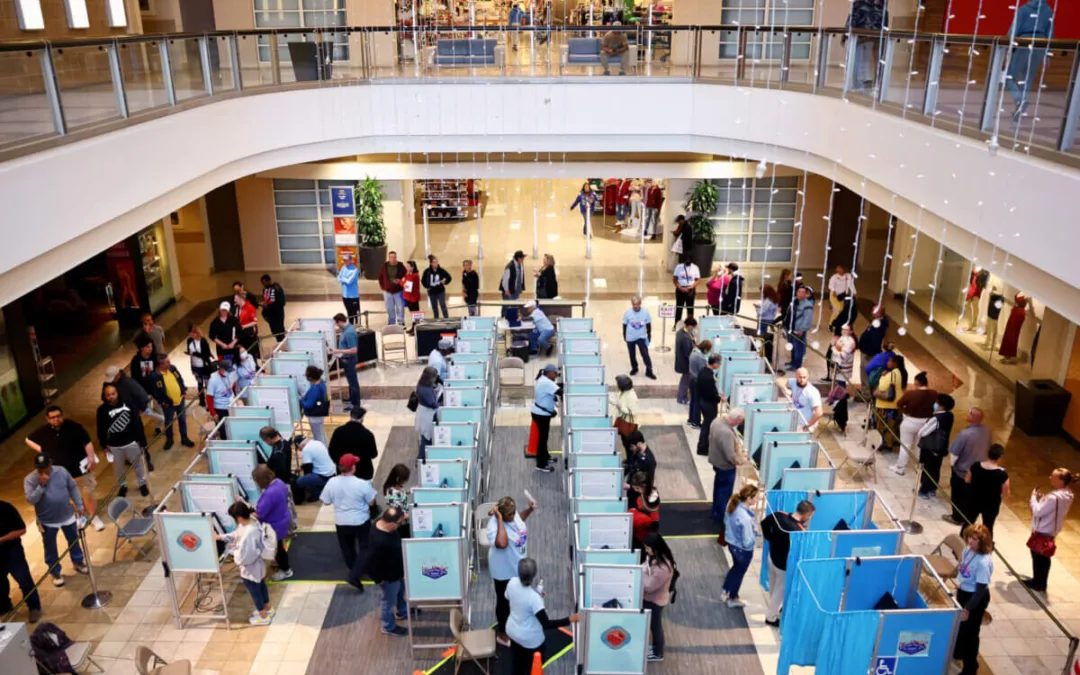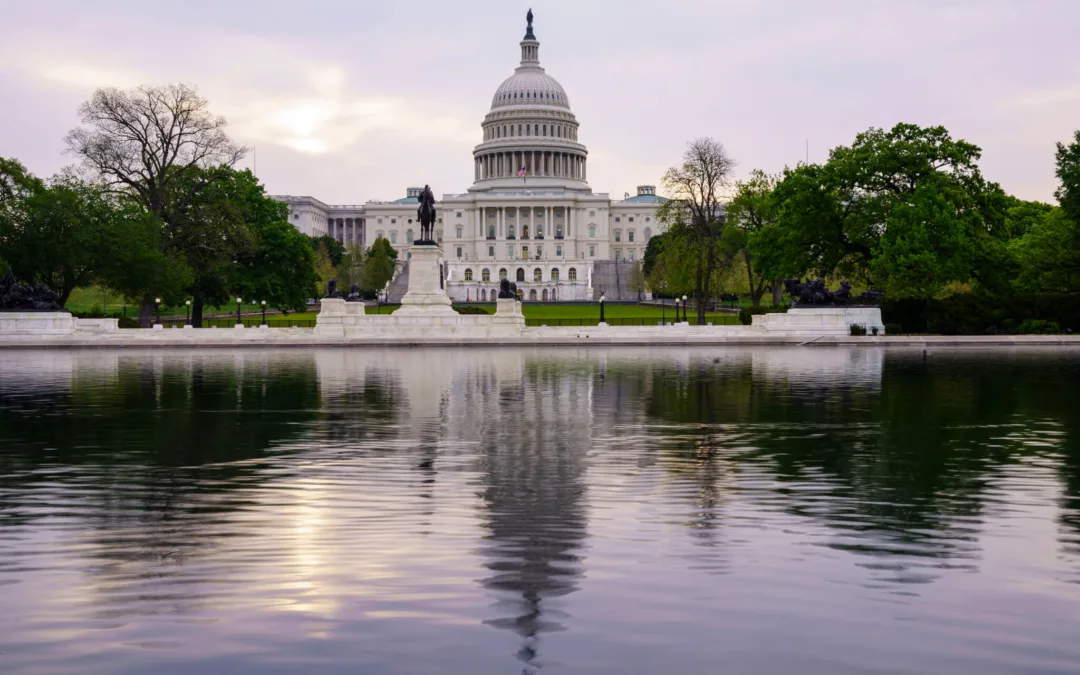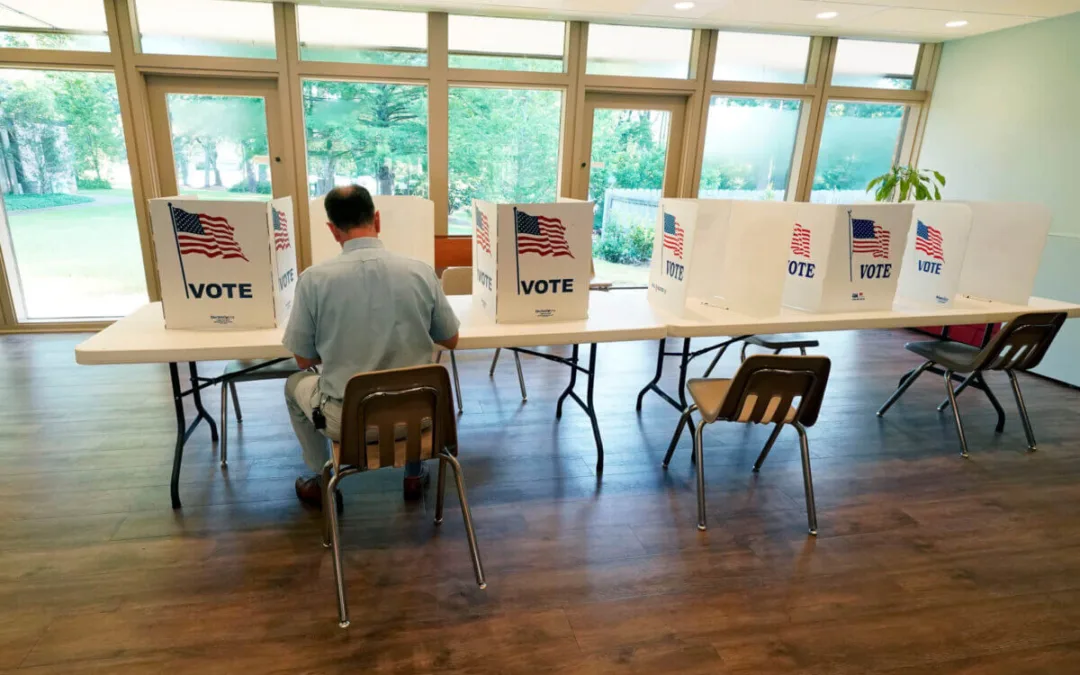
AP Photo/Lynne Sladky
Between coronavirus, poll workers not showing up, and a shortage on sanitizer, it’s unclear what voter turnout will ultimately look like in Tuesday’s presidential primaries.
Hours before polls were scheduled to open on Tuesday, Ohio Gov. Mike DeWine rebuked a state judge’s ruling that the presidential primary must be held and called it off anyway.
“During this time when we face an unprecedented public health crisis, to conduct an election tomorrow would force poll workers and voters to place themselves at an unacceptable health risk of contracting coronavirus,” DeWine said in a statement shared on Twitter Monday night.
For many states, whether to keep or postpone the primaries in the wake of the COVID-19 outbreak has been an unsettling question. Officials in Arizona, Florida, and Illinois, however, decided to hold in-person elections on Tuesday, giving voters an opportunity to choose between Vice President Joe Biden and Sen. Bernie Sanders (I-Vt.) in the Democratic presidential primary.
Since polls opened this morning, however, there have been reports of last-minute changes and fears of contagion among volunteers, some of whom chose not to show up.
“Many poll workers have chosen not to do the job today as a result of the virus,” League of Women Voters of Florida President Patti Brigham told COURIER. “Many poll workers are elderly, so [they] are vulnerable to the virus. We will certainly know more as we begin to assess the turnout at the end of the day and throughout the week.”
Election officials in Palm Beach County said 800 volunteers quit as of Monday, with only 100 new volunteers enlisting to take their place, according to local media. According to the U.S. Election Assistance Commision (EAC), in 2016 roughly 24% of poll workers were 71 or older, while 31% were between 61 and 70.
Brigham also said many of the polling places located at retirement centers have had to move due to the health risk—potentially leaving some voters confused about where to go.
“We asked the Florida Department of Elections to provide highly visible information about this on its website, but that has not happened,” Brigham said. “This is an egregious misstep on their part. They should be providing as much information to the public as they can, not just leaving it up to the supervisors of elections.”
“Many poll workers have chosen not to do the job today as a result of the virus.”
While Arizona voting has largely gone smoothly today, there were a few morning debacles that have been resolved, said Gabrielle Abbott, a representative of the Election Protection Coalition of Arizona.
“Voters are likely confused, as their polling places may have changed and they are understandably concerned about the health risks of going out and voting amid a public health emergency,” Abbott told COURIER. “But, the small number of issues we have seen this morning regarding voter confusion have been properly addressed with signage and other communication.”
Low turnout isn’t expected to hit Florida and Arizona as hard as Illinois. This is largely due to early and absentee voting. In Florida, 1.9 million Democrats have already voted by mail or through early voting. In Arizona, more than 380,000 Democrats have already cast their ballots. For comparison, the total number of people who voted in the Arizona Democratic primary in 2016 was 455,000; in Florida, it was 1.66 million.
In Illinois, however, only 10% of Democrats voted via absentee ballots.
It remains to be seen how the coronavirus outbreak will ultimately affect turnout. Seniors tend to vote in greater numbers than other age groups overall, but are more vulnerable to contracting COVID-19 and the poor outcomes associated with the virus.
Additionally, seniors 65 and older only made up 22% of Illinois’s Democratic primary voters in 2016.
In Chicago, local reports found voters encountered some dysfunction. On Tuesday morning, the city’s Board of Elections announced 50 polling stations had canceled at the last minute, which caused other locations to open later, leaving early morning voters as collateral damage in the chaos.
“We don’t have a clear number of the number of polling places that opened on time and those that have a late opening. We will be getting that shortly,” said Marisel Hernandez, chairwoman of the Chicago Board of Elections, told the local NBC affiliate.
The city’s Board of Elections also put out a call for volunteers this morning via Twitter: “We ask that physically healthy and capable voters who have not traveled recently consider being sworn in to help manage their polling place if they find it is understaffed or overwhelmed.”
As for concerns about spreading the novel coronavirus, precincts in all three states report stocking up on hand sanitizer and disinfectant to ensure the safety of poll workers and voters.
In Florida, election supervisors are taking extra precautions to sanitize voting materials.
“We have put out communications about best practices when voting in person: Take a hand sanitizer to wipe off the stylus before and after signing the tablet. Take a sanitizing cloth to wipe off the table inside your voting booth before and after voting,” Brigham said. “If you wear gloves, make sure to dispose of them after voting without touching anything. If you want to wear a mask, do so. If you are unwell, sign an affidavit to allow someone to drop off your ballot by 7pm today.”
Meanwhile, Chicago volunteers and voters have taken to social media to vent about their frustrations about poor hygiene, and a lack of communication.
Addressing the Board of Election Commissioners for the City of Chicago with a photo of a bottle of hand sanitizer, one volunteer wrote on Facebook: “This is what you provided us with. One 8 oz bottle of hand sanitizer. There are no sanitizing wipes. And worse, there has been zero communication with your coordinators and judges, who spend 15 hours a day in these spots, on how we’re meant to manage a polling place when only 10 people should be in a common space at one time. Oh and in case you were wondering, your phone lines are shut off so we can’t even call for guidance.”
Politics

Teamsters and UPS Reach Tentative Deal to Avoid Strike, 340,000 Workers to Get Raises
The tentative deal represents a huge win for full- and part-time UPS Teamster workers, who would get significant pay raises and better working...



One Republican Senator Is Blocking 265 Military Promotions, Leaving the Marines Without a Confirmed Leader
Sen. Tommy Tuberville's decision means these military officers are not getting the pay raises they’re owed, cannot move their families to wherever...
Local News



Teamsters and UPS Reach Tentative Deal to Avoid Strike, 340,000 Workers to Get Raises
The tentative deal represents a huge win for full- and part-time UPS Teamster workers, who would get significant pay raises and better working...



One Republican Senator Is Blocking 265 Military Promotions, Leaving the Marines Without a Confirmed Leader
Sen. Tommy Tuberville's decision means these military officers are not getting the pay raises they’re owed, cannot move their families to wherever...




